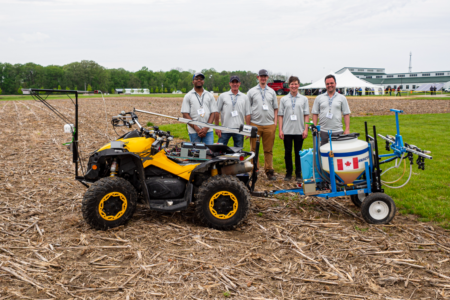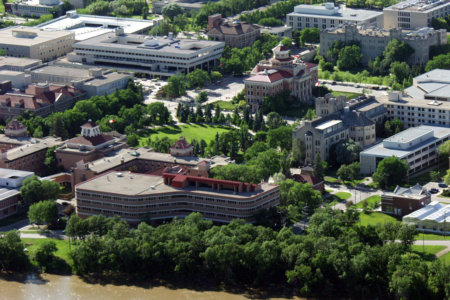Originally from Indonesia, Shania Miralda has always been fascinated by nature, particularly animals and plants. As a child, she loved learning about the natural world, but choosing a specific career path wasn’t always clear. It wasn’t until she began exploring university programmes that agriculture stood out as the right fit. This realisation led her to the University of Manitoba’s (UM) Department of Agribusiness and Agricultural Economics.
The department’s strong selection of agriculture programmes immediately caught her attention. “The university website provided clear and comprehensive information regarding the faculty and its programmes,” Miralda says. “This helped me understand more about the field and what to expect should I become a student there.”
As Miralda learned more about Canada, she discovered that Manitoba is known for its strong agricultural industry — which made UM an even more appealing choice. “I knew the university could help me be successful in the industry,” she says.
Gain the skills to transform global agribusiness
At the Department of Agribusiness and Agricultural Economics, anyone can gain the knowledge and skills to shape the future of agriculture. Related diploma, BSc and graduate programmes instil a strong foundation in microeconomics and advanced quantitative methods, preparing you to tackle real-world challenges, influence policies, and drive innovation in the global food supply chain.
No matter which path you choose, you’ll develop key skills in economic theory, data analytics, and market structures — crucial tools for solving complex issues in the agricultural and food value chain. The BSc and MSc programmes are especially well-rounded.
Miralda pursued both, specialising in Agribusiness. “These programmes encourage students to take related courses to strengthen their knowledge in agriculture/agribusiness, such as economy and business classes, animal and plant science classes, and more,” she says.
“I like how applicable these lessons are. This leads to awareness, a deeper understanding of how complex the industry is, and the knowledge required to be successful in this ever-growing world of agribusiness.”
The future of agribusiness starts here
The BSc in Agribusiness gives you a deep understanding of the entire food chain — from producers to consumers. Over four years, you’ll explore economics, finance, marketing, and management within agribusiness. You can also customise your studies with minors in animal systems, crop protection, food science, soil science, and more.
“I have a Minor in Animal Systems with my Agribusiness BSc,” Miralda says. “I like how the programme allows students to pursue a specific interest and be acknowledged for it.”
While the degree offers flexibility, you’ll master the basics through core courses in economics, statistics, and physical sciences while tackling real-world agricultural challenges. Graduate Michael Wilton benefited from this breadth. As a Diploma student at UM, he became fascinated with agricultural economics. With guidance from faculty mentors, he progressed to earning both a BSc and MSc in Agribusiness with a better idea of his calling.
“The BSc programme builds on the Diploma foundation, with additional layers of theory and information,” he says. “One class I was especially taken by was Food Policy. The class was a coming together of the several theoretical economics courses taken and how they apply to the very real world of food production, trade, and government policy.”

Graduate training in agribusiness and agricultural economics equips students to tackle real-world challenges in food production, policy, risk, marketing, finance, trade, and resource management. Source: University of Manitoba
Graduate studies take exposure to another level. The department offers comprehensive MSc degrees in Agribusiness, Agricultural Economics, and Environmental and Resource Economics.
The MSc in Agribusiness and Agricultural Economics is a two-year, thesis-based programme that blends coursework with research. On this route, you will explore topics like policy, risk management, international trade, and resource management. You’ll benefit from internship opportunities in one of Canada’s most agriculturally vibrant regions. You’ll even contribute to world-changing research in state-of-the-art labs.
“My research was using remotely sensed vegetation imagery to estimate crop yields,” Wilton explains. “In my current job as a market analyst at Mercantile Consulting Venture Inc., I use this technology on nearly a daily basis. It is an input that I regularly use when forecasting crop yields for various regions.”
Learning and networking at the heart of the industry
UM offers students unparalleled learning opportunities, largely thanks to its location in Winnipeg — the heart of Canada’s agriculture industry. The city is home to 189 food and beverage manufacturing companies and serves as a hub for groundbreaking agri-food research, from plant protein extraction to cereal grains and swine genetics. It also plays a crucial role in Canada’s grain handling and transportation networks, with major processing facilities and key national organisations for grains, canola, and pulses.
For students, this means direct access to the industry. “We were able to interact with firms that were either directly or indirectly involved in agriculture,” Wilton says. “One such opportunity was to attend the Grain World Conference, a gathering of grain industry leaders from around the country. At the summit, I was introduced to one of the panel hosts, Marlene Boersch, the managing partner of Mercantile Consulting Venture Inc., who is now my current boss.”
Ready to follow in his footsteps? If you’re an international student, UM provides dedicated International Student Services to assist with applications and help ease your transition to life in Canada. Learn more about the University of Manitoba.
Follow the University of Manitoba on Facebook, X, Instagram, YouTube, and LinkedIn













